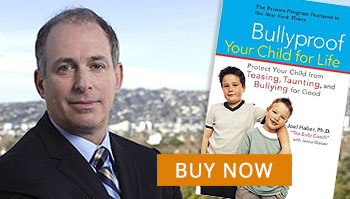
Copyright: Kittitee Pangwang / 123RF Stock Photo
One key point I’d like to impress upon parents is that—strange as it may sound now—there can be something really positive about bullying.
Think about the times when you’ve felt really good about yourself. Go ahead: Think of a few examples of times when you felt proud of yourself.
Got it?
Most of the experiences that really build our confidence and self-worth aren’t just about winning. They’re about being on the bottom and finding our way up. Does that fit your examples? Maybe you were proud of a time you overcame an addiction, or passed a difficult test, or stood up for yourself to a boss who terrified you or survived a life-threatening situation.
That’s the whole secret to developing real self-esteem. It’s not about heaping praise on someone; it’s about those times when they were really down and figured out how to pull themselves out of it.
When they faced tremendous challenges and learned they were strong enough, smart enough, brave enough, good enough to overcome the odds.
So the first attitude adjustment I’d like you as a parent or caretaker to make is that finding out your child is being bullied or is a bully isn’t a reason to get hysterical. That’s the tendency—no parents want to see their children suffer, of course, and they can get pretty fired up when they find out their children are being targeted. I’ve talked to hundreds of parents whose first reaction is to cry, scream, yank the kid out of school, threaten to sue the school . . .
The truth is that your child is going to take cues from you. If you’re all worked up, the child will get all worked up (and that’s the last thing you want because it’ll just fuel the bully). If you rush in to shield the child and save the day, the child learns to be helpless. No lesson learned. No opportunity for growth.
Except in really extreme cases, the goal should always be for the child to have control of the solution. Of course, parents and other adults can and should help, but not take over and leave the child out of the plan. It’s important for the child to feel that he or she did something positive to get out of the situation.
That’s the only reason I can continue doing the work I do. If all I saw was misery and victimization, I could never be a bully coach and still be a functioning and happy person. But instead, what I see is an opportunity. I know that if I can help children learn the skills they need to stop being bullied, they’re going to gain self-confidence that will be with them for the rest of their lives. They’re going to feel like they’ve gone from being losers to being winners, and that feeling is the real power that can propel them to great heights.
Yes, bullying is something to take seriously, and no, I don’t expect you to shout “Hooray!” when you find out your child is being victimized. But I ask you to look at it as a challenge with great potential rewards. Teaching a child resilience is like giving that child keys to a magic kingdom. The world becomes brighter, the impossible feels possible, and future challenges don’t feel so hopeless.
Next, we’ll examine this opportunity and use it for all it’s worth. Know that even if the situation looks grim right now, there’s a real possibility that your child will grow from this and become stronger and happier than ever before. The greatest victories are the ones we struggle to achieve.
